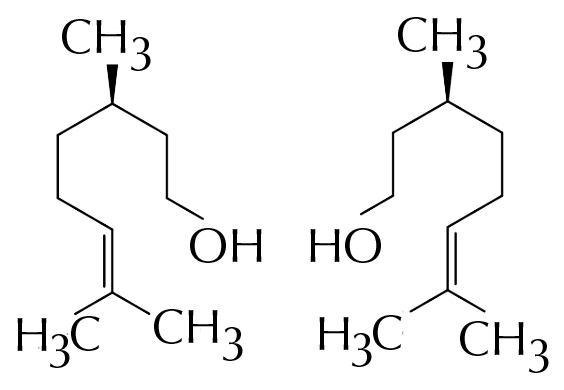What Is Citronellol?
Citronellol is a naturally derived ingredient that is added to cosmetics and personal care products as a fragrance due to its sweet, floral scent.
Citronellol, also known as dihydrogeraniol, is a natural acyclic monoterpenoid, a type of modified terpene. Terpenes are a large and diverse class of organic compounds produced by a variety of plants. They often have a strong scent and may protect the plants that produce them by deterring herbivores and by attracting predators and parasites of herbivores.
Citronellol, which is found in citronella oils, in the oils of rose and geranium oil. Citronellol has been reported in about 70 essential oils, for instance, citronella, rose, geranium, neroli, chamomile, tagetes, lemongrass, basil, and lavender.

Citronellol
the good:Citronellol is mainly used to improve the scent of products.
the not so good:Can be irritating for some skin types.
Who is it for?All skin types except those that have an identified allergy to it.
Synergetic ingredients:Works well with most ingredients.
Keep an eye on:Citronellol is in many different product types including, hair care, skincare, and cosmetics.
Why Is Citronellol In Products?
Citronellol is a naturally occurring ingredient used in skincare and cosmetic formulations to improve the scent of products. It is also often used in perfume formulations to help enhance the intensity of other scent ingredients.
Scent
In perfumes, citronellol functions as a fragrance enhancer since it has the ability to enhance the aromas of floral types especially rose. In the skincare industry, citronellol is prominently used as a fragrance ingredient for cosmetics and skincare products.
Sensitivity
Research suggests that the topical application of citronellol has low permeability and potency, meaning that it doesn’t penetrate deeply into the skin or isn’t absorbed into the skin. Unlike many essential oil components, citronellol doesn’t cause irritation. While this is the case, it can cause sensitivity and irritation in some skin types. The low likelihood of irritation makes citronellol an ideal ingredient to improve the scent of products, such as shampoos, lotions, creams, shaving creams, and bath products.
Insect repellant
You may be familiar with citronellol since it is one of the active components of citronella oil insect repellents and citronella candles. In fact, citronella has been registered as a gentle, plant-based insect repellent in the U.S. since 1948. Citronella insect repellents have even been shown to repel dangerous Aedes aegypti mosquitoes, which are capable of spreading dengue fever and the Zika virus.
Is Citronellol Safe?
The United States Food and Drug Administration considers citronellol as generally recognized as safe for direct addition to food. The Cosmetic Ingredient Review Expert Panel defers review of individual fragrance ingredients to the International Fragrance Association program unless the ingredient has significant uses other than as a fragrance.
The safety of citronellol has been evaluated by the Research Institute for Fragrance Materials Expert Panel. Based on the evaluation, citronellol is restricted in fragrances because of potential sensitization. However, the degree to which citronellol can cause an allergic reaction in humans is disputed.
As mentioned above, citronellol has low permeability when applied to the skin, which means it is not absorbed into the deeper layers of skin. However, when products containing citronellol are applied to the skin, a problem arises when citronellol is exposed to air. This exposure causes the unstable citronellol molecule to oxidize, which is believed to trigger aggravation on the skin. Due to the possibility of an allergic reaction, those with sensitive skin should try to avoid citronellol or perform a patch test with any product containing this ingredient.







